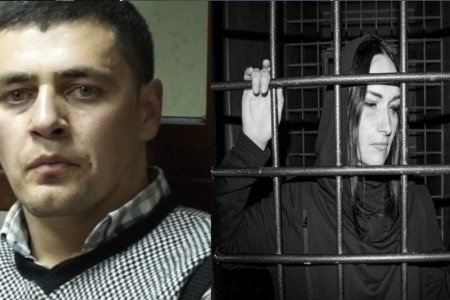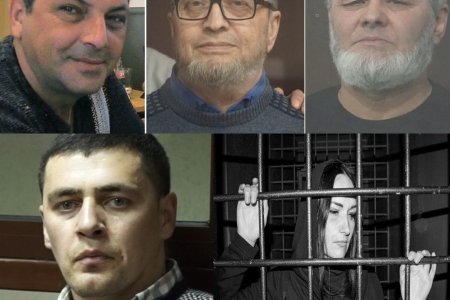
Russia’s Southern District Military Court has sentenced Ihor Korchynsky to 18 years’ maximum-security imprisonment on charges suspiciously similar to those seen in a long series of extremely dubious ‘saboteur trials’ in occupied Crimea.
Citing the FSB, Russian state media reported on 3 July 2023 that “a Russian citizen” (b. 1988) had been “detained on suspicion of intending to blow up the car “ of Sergei Aksyonov, Russian-installed ‘leader’ of occupied Crimea. Although the reports claimed that the man, identified only as having the code name ‘Karatist’ had been seized while taking explosives out of a hiding place, the video shows a man walkingalong the road, smoking and looking relaxed, and then two armed men in full military gear pinning somebody to the ground. The video then goes on to show the man, his face slightly obscured, apparently ‘confessing’ to everything and explaining how he had been ‘recruited’ by Ukraine’s Security Service. [SBU] and had undergone a training course in reconnaissance – sabotage activities, including explosive devices. The man, his face only partially visible, reels off the words about having been recruited by an SBU officer called Ihor and having been given the code name ‘Karatist’. He had, purportedly, been instructed to go to Simferopol in Crimea, rent an apartment, buy a phone and find work. He was to wait until he learned where the address was of the car where he was allegedly supposed to plant a bomb.
The indictment claimed that Korchynsky had, in December 2022, agreed to a proposal from an SBU officer “to carry out unlawful activities against the security of the Russian Federation” and had been trained in Zaporizhzhia by the SBU on how to use explosives.
He was convicted of an attempted terrorist act (Article 30 § 1 and 205 § 1 of Russia’s criminal code); of training in terrorism (Article 205 § 3) and unlawfully obtaining an explosive (Article 222.1 §). He was sentenced to 18 years’ maximum-security imprisonment with the first four years in a prison, the worst of Russia’s penal institutions, and also ordered to pay a steep 350 thousand roubles.
Korchynsky was added to Russia’s notorious ‘list of extremists and terrorists’ long before this sentence, with the entry stated that he had been born in Melitopol. The latter has been under Russian occupation since soon after Russia’s full-scale invasion of Ukraine, and it is quite possible that Korchynsky is one of a huge number of residents of Melitopol seized by the Russians and held illegally.
Disturbingly little is known about the 35-year-old Ukrainian aside from the reports in Russian media and from the Memorial Society. The genre, however, is all too familiar and repetitive. Men held incommunicado are videoed, giving ‘confessions’ which invariably involve receiving instructions from Ukraine’s SBU or Military Intelligence. Essentially everything about such videos appears staged and we do know from several Ukrainian political prisoners that they were indeed fakes. Very often the men tell lawyers, or the court, that they were tortured into making the ‘confessions’ and forced to learn these off by heart. On at least one occasion, the Ukrainian, Oleksiy Stohniy, was video ‘being detained’ during the day, whereas this had taken place at night. He was also shown ‘confessing’ to involvement in a ‘saboteur plot’ yet ultimately tried on completely different charges.
There is, thus, overwhelming evidence that the videoed confessions are obtained through duress. There is, on the contrary, effectively no proof that the alleged terrorist acts were ever planned. Aksyonov, for example, claimed that four attempts to kill him had been thwarted in the last year, however there was nothing to back this except equally unsubstantiated assertions from the FSB.
During the ‘trials’ of Volodymyr Dudka and Oleksiy Besarabov; of journalist Vladyslav Yesypenko; Oleh Prykhodko, and many others, damning evidence was presented in court of how material had been falsified and how the charges did not bear any scrutiny. This is invariably ignored by the ‘courts’ on occupied territory or by the Southern District Military Court.
Worth noting that virtually all the Crimean Tatars or other Ukrainians sentenced in occupied Crimea to terms of imprisonment for alleged ‘sabotage’ plots have been recognized as political prisoners by, among others, the Memorial Support for Political Prisoners Project. Iryna Sedova from the Crimean Human Rights Group has reported at least 40 people claimed to be involved in ‘sabotage plots’. Russia is, however, also using such charges against civilians abducted from other Ukrainian territory under occupation, and the overall number of victims is increasing.



